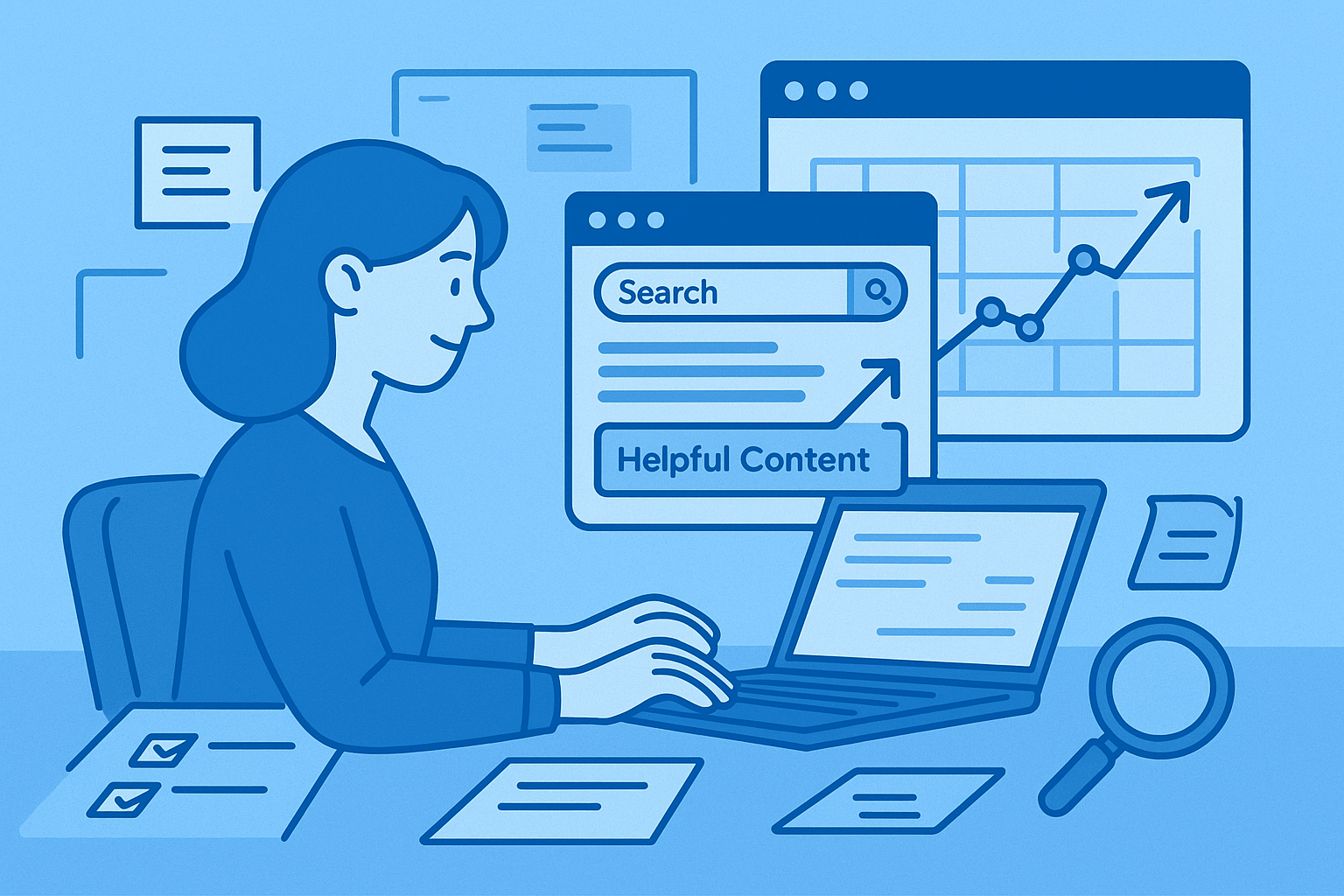“Helpful content” is everywhere in SEO discussions—and for good reason. Since 2022, Google has been rolling out changes that reward people-first content and penalize pages created just to game rankings. By the end of this article, you’ll know what helpful content really means, how Google evaluates it, and how to audit your site to align with these standards.

What is “Helpful Content”?
Definition & core principles
Google defines helpful content as content created primarily for people, not for search engines. It’s about:
- Answering real questions
- Offering original insights
- Creating genuine value for readers
This aligns closely with Google’s E‑E‑A‑T framework: Experience, Expertise, Authoritativeness, and Trustworthiness.
The difference between helpful and SEO-first content? Helpful content educates and solves problems. SEO-first or thin content exists only to capture traffic, often rehashing what’s already out there without adding anything new.
Evolution: the Helpful Content Update / System
The Helpful Content Update first launched in 2022. Google has since refined it and, by March 2024, fully integrated it into its core algorithm. Key changes:
- Site-wide classifier: Google doesn’t just evaluate single pages. Enough unhelpful content can drag down an entire domain.
- Continuous refinements: Updates now roll into core updates, making helpfulness an always-on ranking factor.
For content strategy in 2025 and beyond, this means one thing: consistency. You can’t get away with publishing filler anymore. Every piece of content needs to prove its value.
Why it matters: SEO impact & risks
How Google uses helpful content signals
Google evaluates sites holistically. If your domain hosts too much low-value content, even your strong pages may struggle. Signals include:
- How well content satisfies search intent
- Original insights over fluff
- Clear, trustworthy presentation
Common pitfalls & penalties
Sites often get hit for:
- Thin summaries with no added value
- Keyword-stuffed SEO-first posts
- Publishing too many generic, low-value pages
Signs your site might be affected
Watch for:
- Traffic drops across multiple pages
- Google Search Console indexing issues
- High bounce rates and low dwell time
How to create helpful content (best practices)
Strategy & planning
- Start with user and search intent: What does your audience need?
- Select topics you can cover thoroughly.
- Use content clusters to build topical authority.
Content creation techniques
- Share firsthand experience, case studies, and data.
- Include expert quotes and original research.
- Add insights competitors missed.
- Use structure: clear headings, lists, visuals.
On‑page & technical alignment
- Use descriptive, accurate titles.
- Write meta descriptions that reflect the content.
- Optimize for page speed, readability, and mobile.
- Add internal links to related resources.
Auditing & ongoing content cleanup
- Identify weak or unhelpful pages—improve or retire them.
- Consolidate overlapping articles.
- Refresh outdated information regularly.
Helpful content in action: Examples & mini case studies
Strong examples often:
- Provide step-by-step walkthroughs instead of summaries.
- Use unique research or first-hand experience.
- Layer in visuals and data for clarity.
Weaker examples:
- Paraphrase what’s already on page one.
- Prioritize keyword stuffing over readability.
Measuring success & recovery
Metrics to watch
- Organic traffic trends
- Engagement metrics (bounce, dwell time, scroll depth)
- Indexed pages in Search Console
- Average time on page
Recovering after a drop
If you’re hit:
- Audit your content for quality gaps.
- Refresh or remove weak pages.
- Re-optimize strong content.
- Be patient, recovery from a Google update is gradual.
Helpful content & future trends
- AI content: Safe if it adds value, fact-checks, and includes human insights.
- User expectations: More multimedia, interactivity, and original data.
- Algorithm shifts: Google will likely give even more weight to content showing clear expertise and real experience.
How SearchSEO supports your traffic boost
Publishing helpful content is the foundation, but visibility doesn’t end with content quality. SearchSEO amplifies your strategy by:
- Boosting click-through signals that tell Google users prefer your pages.
- Simulating authentic user behavior with traffic routed through real residential IPs.
- Offering precise targeting so you can focus on the countries or regions that matter most.
- Supporting a balanced SEO strategy by pairing high-quality content with proven CTR improvements.
With SearchSEO, your helpful content isn’t just well-written, it’s also more discoverable, giving you the competitive edge in search rankings.
Ready to see the difference? Try SearchSEO today and boost your traffic with people-first clicks that Google loves.


.svg)

.svg)
%201.png)








.svg)